

Professionalism in the Digital Environment (PriDE) Developing professionalism in the digital environment (PriDE) in which we live, requires us to take an institution-wide approach to developing digital literacies.
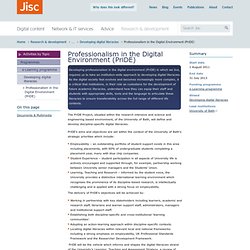
As the digital society fast evolves and becomes increasingly more complex, it is critical that institutions, in their role as custodians for the development of future academic literacies, understand how they can equip their staff and students with appropriate skills, tools and the language to articulate these literacies to ensure transferability across the full range of different life contexts. The PriDE Project, situated within the research intensive and science and engineering based environment, of the University of Bath, will define and develop discipline-specific digital literacies. PriDE’s aims and objectives are set within the context of the University of Bath’s strategic priorities which include: The delivery of PriDE’s objectives will be achieved by: Objectives PriDE’s objectives are to:
Institutional Student ePioneer Partnerships (InStePP) Summary InStePP seeks to create and institutionally embed a variety of active partnerships with students and, in so doing, develop, implement and exemplify: i) institutional approaches to partnerships as an integral part of digital literacy development in the curriculum and in employability policy and practice; ii) digital literacies contextualized for disciplines and for career development; and iii) student roles and activities which support the development of staff digital literacies.
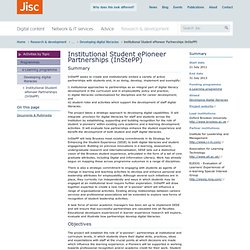
The project takes a strategic approach to developing digital capabilities. It will integrate provision for digital literacies for staff and students across the institution by establishing, supporting and building recognition for the role of student ‘e-pioneers’ within existing core academic and e-learning development activities. It will evaluate how partnerships enhance the student experience and benefit the development of both student and staff digital literacies. HEDG: Strategic Approach to Dissemination of Digital Literacies for Enhancement (SADDLE) Summary The Heads of Educational Development Group (HEDG) is a network organisation for institutional leaders with direct responsibility for learning and teaching enhancement in UK Higher Education institutions, and with a common remit for informing institutional strategy and translating it into academic practice.
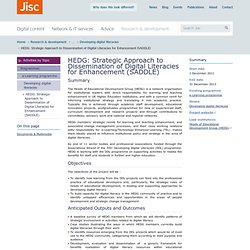
Typically this is achieved through academic staff development, educational innovation projects, postgraduates programmes for new or experienced staff, curriculum development and research projects and through contributions to committees, advisory work and national and regional networks. HEDG members’ strategic remits for learning and teaching enhancement, and associated change management processes, and their close working relations with/ responsibility for e-Learning/Technology Enhanced Learning (TEL) makes them ideally placed to influence institutional policy and strategy in the area of digital literacies.
Objectives. Digitally Ready. The University of Reading has a culture of ‘digital adoption’ at its core, with an eagerness from senior managers and decision-making groups to be in the vanguard of innovative working practices and technologies to help drive the University – staff and students - forward.
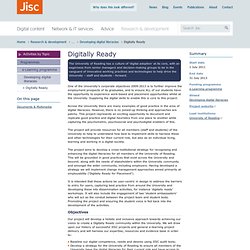
One of the University’s corporate objectives 2009-2013 is to further improve the employment prospects of its graduates, and to ensure ALL of our students have the opportunity to experience work-based and placement opportunities whilst at the University. Supplying the digital skills to enable this is core to this project. Across the University there are many examples of good practice in the area of digital literacies. However, there is no joined-up thinking and approaches are patchy. This project represents an exciting opportunity to document and replicate good practice and digital heuristics from one place to another while capturing the psychometric, psychosocial and psychodigital enablers of this. Objectives Project Team. Digidol – Developing Digital Literacy.
Summary Project Digidol aims to embed processes and practices that enable the development of Digital Literacy in all staff and students across all areas and levels of the University.
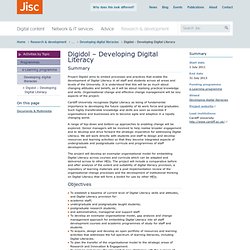
It is understood that this will be as much about changing attitudes and beliefs, as it will be about realising practical knowledge and skills. Organisational change and effective change management will be key aspects of the project. Cardiff University recognises Digital Literacy as being of fundamental importance to developing the future capability of its work force and graduates. Such highly transferable knowledge and skills are seen as essential if organisations and businesses are to become agile and adaptive in a rapidly changing world. A range of top-down and bottom-up approaches to enabling change will be explored.